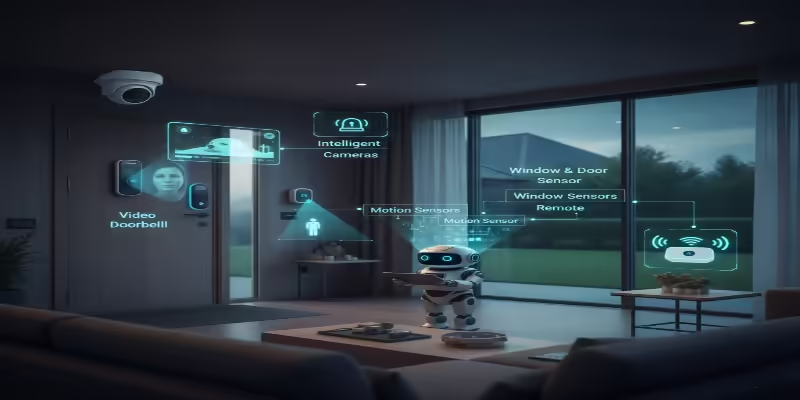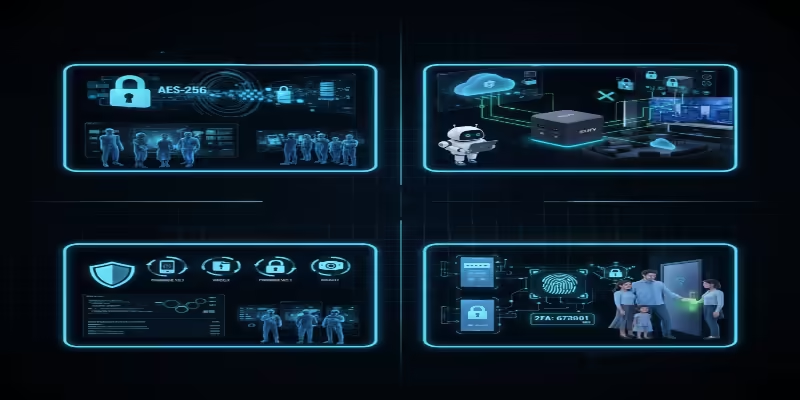Smart Home Security Systems: Important Information for Purchasers
In 2025, home security no longer solely depended on traditional locks and alarms; it had become digital, clever, and interconnected. The arrival of smart home security systems has revolutionized the manner in which homeowners ensure the safety of their homes. The advent of AI-powered monitoring, IoT-connected devices, and home automation safety tools has led to security becoming less reactive and more predictive.
Currently, systems are not only able to notify you of an incident, but they also scrutinise behavioural patterns, identify familiar faces, and foresee dangers even before they happen. No matter if you are on a trip overseas or just chilling in your living room, the opportunity to have control over and keep an eye on your property via a smartphone has been a game-changer in terms of what the real definition of a worry-free state is.
Today, the homeowner is demanding smart security gadgets that, apart from being trustworthy, are also capable, energy-saving, and able to integrate with a larger home automation network.
How Smart Home Security Systems Work
Essentially,a majority of intelligent home security systems connect visual units, detectors, locks, and signalling devices through a central conduit or software, thus allowing customers to manage them from a distance. In general, these gadgets operate as follows:
Sensors & Cameras: They can observe the movement, sound, or the unlocking of a door or window and, in addition to that, notify it immediately.
AI Detection: It recognizes the usual movement and hence, any abnormal or potentially threatening one.
Remote Access: Giving the user the ability to manage the system (arming/disarming), see the live video, and talk through two-way audio from any location.
**Automation Integration: ** Allows the home to upgrade with the use of smart lighting, voice assistants, and climate control compatibility.
This kind of interconnected approach not only secures your home but also makes it intelligent enough to recognize its surroundings.
Key Benefits of Smart Security Devices
Installing smart home security is advantageous in a number of ways that clearly extend beyond simple safety measures:
1. 24/7 Monitoring and Instant Alerts
Smart systems are able to send instant push notifications to the user's smartphone every time they detect movement or any other kind of unusual activity.
2. AI-Powered Accuracy
Artificial intelligence reduces the number of false alarms resulting from it recognizing familiar faces and pets, thus ensuring that only in the case of real threats will the system send an alert.
3. Remote Control and Monitoring
In fact, through live feeds, it is possible for you to carry out the task yourself or if you are not there, you can request someone else to do it on your behalf. As an example, you may secure the home or check that the alarm can be heard from any place (foreign country, another city, or even a different room) when you are at work or on a holiday.
4. Integration with Smart Home Ecosystems
In case your security system is linked up with Alexa, Google Home, or Apple HomeKit, then you can give a wireless command to your safety devices or automate your daily activities; for example, having the lights turned on when you exit.
5. Energy and Cost Efficiency
Smart security devices have, on their part, been endowed with features such as recording that is triggered by movement, battery-saving operations, and ecologically friendly designs. They do all this without wasting energy, and thus, you are given the double benefit of security and energy saving.
6. Peace of Mind and Safety
The major benefit? The feeling of security. In any case of the above-mentioned helping family members, securing your property, or protecting your valuables, smart security provides you with the ultimate feeling of control and welfare.
Essential Components of a Smart Home Security System

Understanding the various components of a full home security system is basically your initial step in turning the system into your assistant.
**Intelligent Cameras: ** In most cases, they record the video in HD or 4K, use night vision, and are equipped with an AI-based detection system for monitoring that is more detailed and accurate.
Video Doorbells: Through these, you have live video streaming and, via the audio, can talk with the visitor or delivery person.
Smart Locks: The first of these a smart lock provides is keyless entry; next up is the feature of temporary guest access code creation, and last but not least is remote access via a smartphone app.
**Motion Sensors: ** The main function of these is to detect intruder movement; thus, they may be configured to dispatch notifications or turn on alarms.
Window & Door Sensors: They are always ready to give you a call the very moment they detect a window or door being opened without your consent.
Smart Alarms: They are in collaboration with your mobile device to give you an intruder or emergency notice.
AI and Automation: The Future of Home Security

Integrating artificial intelligence in intelligent security gadgets is one of the ways that technology is changing the security of homes. In 2025, such systems not only respond but also foresee.
AI studies the patterns of movement, can distinguish between normal activities and suspicious ones, and can even identify situations like broken glass or fire by using sound recognition. Some advanced devices employ machine learning to evolve along with them, thus becoming more intelligent with each incident they observe.
Automation is of the same importance as well. Homeowners may establish personalised programmes; for example, doors can be locked automatically at sunset, outdoor lights can be turned on when motion is detected, or cameras can be activated when no one is at home.
Such a safety measure at the moment of danger greatly contributes to people’s safety, while at the same time, it keeps the functioning simple and saves energy.
Privacy and Data Security Considerations
Though smart home technology is a great game changer, privacy is still the number one worry. In a scenario where gadgets are incessantly gathering data and linking to cloud servers, users should know the ways in which their data is kept and secured.
It is worth pondering the following points before making a purchase:
Data Encryption: Check that the company implements end-to-end encryption for video and user data.
Local Storage Options: Choose devices that provide local storage (like Eufy) to lessen the need for cloud services.
Regular Updates: Companies that deliver regular firmware updates to their products are less attractive to hackers.
Multi-Factor Authentication: Helps to ensure that only authorized users can gain access by adding another layer of security.
Protection is not only at your doorstep but also in your device’s digital backend.
Top Smart Home Security Brands in 2025
The market for smart home security systems in 2025 is full of creative brands that deliver advanced safety, convenience, and integration. These are some of the top names every buyer should be aware of:
Ring
With its smart video doorbells and motion-activated alerts, Ring is a leader whose idea has been widely followed in the smart security industry. Homeowners get the best user experience as well as security from Alexa integration and DIY installation provided by the company (Ring). They can be sure that their home security is reliable, as well as that the solution is easy to use and install, thus making it one of the top choices for homeowners.
Arlo
Arlo does not stop setting the bar with its ultra-clear wireless cameras, AI-driven motion detection, and sophisticated video analytics. The company provides the perfect solution for local customers and business clients who require the highest quality of video surveillance and want to be able to get the footage remotely via a user-friendly mobile app.
Google Nest
Google Nest offers cameras, alarms, and sensors that are compatible with the Google Home ecosystem. It aims at people who are willing to give up some privacy in exchange for a perfectly integrated smart home system. With its neat interface and excellent automation features, the system ensures home safety in the most convenient way for tech-savvy users.
SimpliSafe
Good consideration for homeowners trying to save money would be to go for SimpliSafe, which provides reasonably complete packages that are not only simple to perform by oneself but also easy in terms of user-friendliness and highly productive in accomplishing goals. Most of them decide to compromise on their security to get the best of both worlds: a full protection service free of high monthly fees or complicated setups.
Eufy
Eufy is a company that prioritises consumer privacy over everything else – they provide local data storage, system encryption, and use AI technology for facial recognition to preserve privacy. Besides the fact that they don't require any cloud services and they have very sturdy products, the buyers will get what they want – control, security, and the best smart home technology without having to incur added costs periodically.
These brands are unique in their choke points, be it hassle-free voice control, powerful AI analytics, or a tight budget. They are the leading examples of smart home security systems in 2025, the era when technological innovation, safety, and convenience merged into one seamless experience.
Tips for Buyers: Choosing the Right Smart Security System
Wha to consider if you want a home security system that "thinks" by itself? These points might help you.
1. Look at How Large Your Home Is:
Make a decision on the security system that can grow or shrink with your home, be it a one-room apartment or a multi-floor mansion.
2. Are They Compatible?:
Make sure the devices function in your present smart home system (Google, Alexa, or Apple).
3. Identify AI Capabilities:
Pick the ones with intelligent motion detection and facial recognition to get more trustworthiness.
4. Think about Storage Solutions:
Choose the brand that is willing to offer you the best of both worlds: cloud and local storage.
5. Make a Plan for Internet Backup:
It is always good to have a plan for when the Wi-Fi is down. In such cases, devices supporting cellular or offline working will be your best friends.
6. Subscription Plans:
Monthly fees are required if you want to use the premium features of some brands. These should be considered in your long-term budget.
The Future of Smart Home Security Systems
In the future, the smartest home devices will still be around, but they will have AI integration, biometric verification, and predictive threat analytics. Up to 2026, we can anticipate that the fire departments will be notified by the alert systems, detecting in real time the fires, gas leaks, and the cause of the structural vibrations, that is, all from a single unified interface.
Moreover, energy-efficient devices powered by green energy and cameras enabled by solar energy are becoming the trend of home security, which is gaining more and more popularity among consumers.
With AI development, home automation safety will not be only a matter of simple control; rather, it will be a question of autonomous decision-making. Hence, the systems will be able to take preventive action by themselves, for instance, giving the police a call in case of an emergency.
Conclusion: Smart Security for Smarter Living
Smart home security systems powered by AI, real-time connectivity, and home automation security are not only fashionable anymore. With such a system, you get the highest safety and tranquillity of spirit.
It does not matter if you select smart security tools by the likes of Ring, Nest, or Eufy. The main thing is to discover a configuration that meets the requirements of your house, your privacy, and the direction you will be taking in the future.
The coming era of security is intelligent, anticipative, and absolutely customized - and this era begins with the most excellent smart home tech of 2025 at your door.